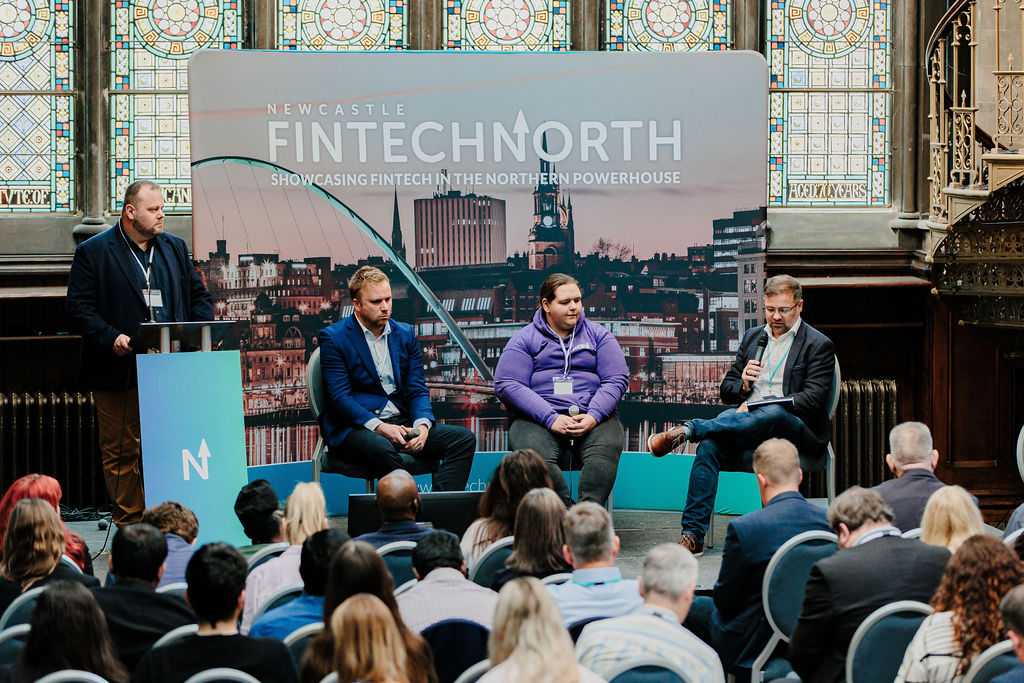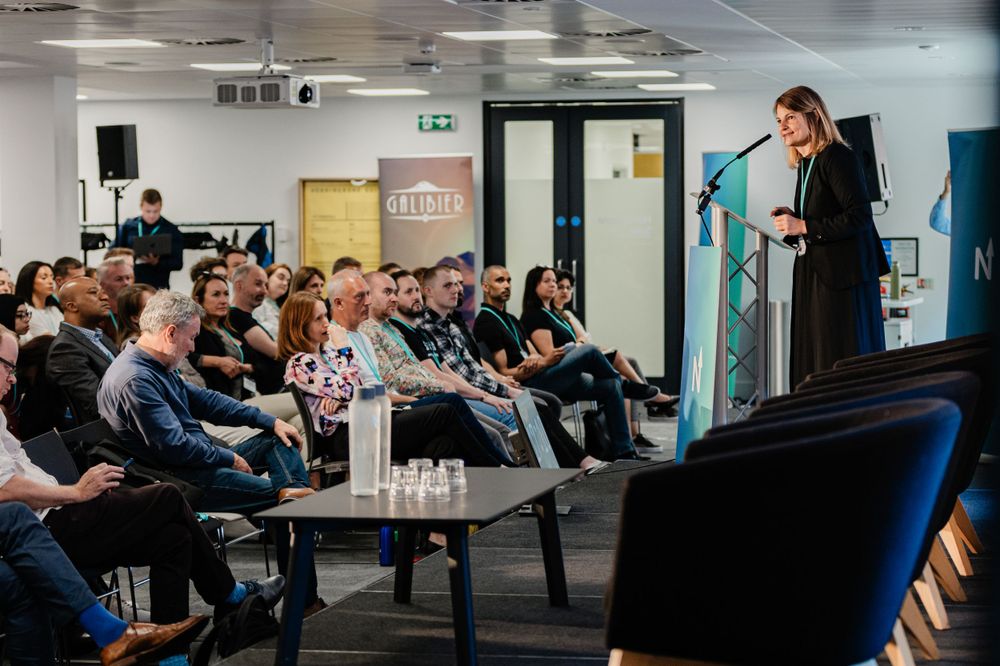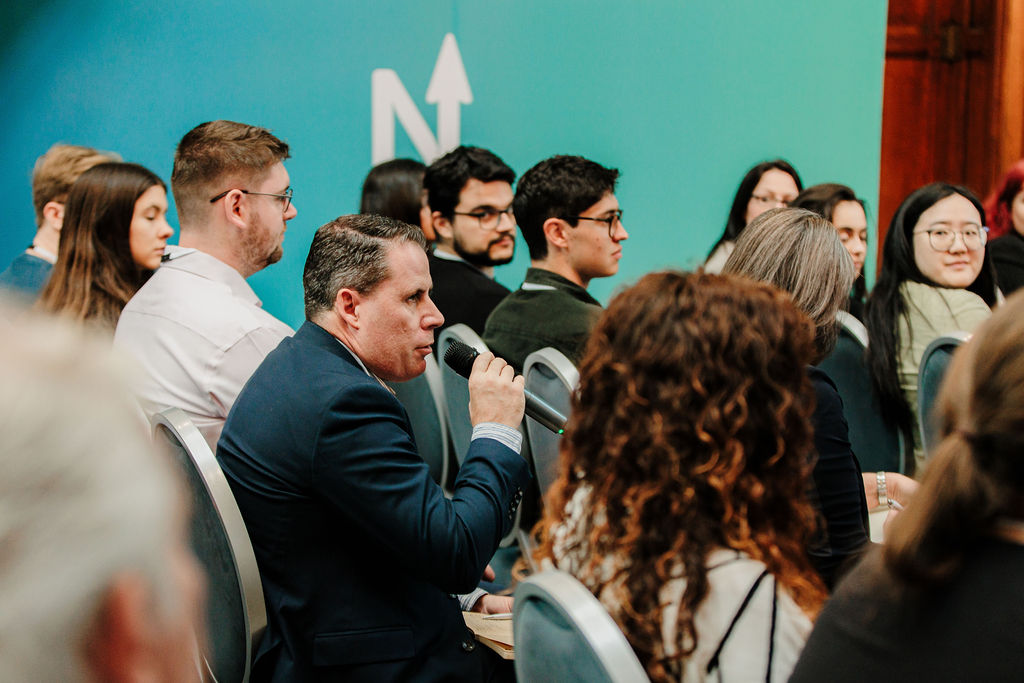Northern FinTech Summit Day 1 – Market and People Write-Up
On the 1st of October, the entire North’s FinTech community came together for the second annual Northern FinTech Summit, hosted in partnership with Barclays Eagle Labs, Aviva, Cyber Alchemy, and Lenvi. With thanks to our namebadge sponsors, Incuto, and our inward investment partners West Yorkshire Combined Authority, Invest Liverpool City Region, North East Combined Authority and MIDAS – Manchester’s Inward Investment Agency.
Set against the backdrop of the historic Guildhall, a space long associated with collaboration, culture, and decision-making, delegates came together to explore the future of Northern FinTech. Evolving from a historic convening space for the city’s leaders into a University of York building and home to a Barclays Eagle Lab driving financial innovation, the Guildhall perfectly embodied the day’s themes of connection and growth.
Day 1 of the Summit centred around two core themes: Market and People. The morning focused on the market landscape, highlighting opportunities for growth across the Northern FinTech ecosystem and examining what’s next for UK FinTech in a rapidly evolving environment. Speakers shared insights into regulation, international perspectives, and the state of the Northern market, setting the stage for discussions on how the region can continue to drive innovation and investment.
Joe Roche, General Manager at FinTech North, opened the morning by welcoming delegates and sharing an overview of the organisation’s recent activity and strategic direction. The return of the Summit – one of the community’s most-loved events – reflected the continued momentum, interest, and strength of the FinTech sector across the North.
Next, Chris Lunardi, Ecosystem Manager at Barclays Eagle Labs provided a welcome on behalf of the venue and spoke on the suite of support the Eagle Labs provide for entrepreneurs.
FinTech in the North
Before kicking off the market-focussed session Julian Wells, Director at Whitecap Consulting, took some time to acknowledge Chris Sier’s stepping down as chair of FinTech North, in light of his ongoing health challenges. To honour his legacy, the opening keynote at each of our annual conferences will now be known as the Chris Sier Keynote; a space for the kind of insightful, provocative and inspiring contributions he so often delivered.
Julian then spent some time providing an overview of Whitecap Consulting’s recent North of England FinTech Report, highlighting the development, size and make-up of the sector in the north, as well as some recommendations to continue to drive sector growth including: a North of England FinTech Accelerator, a Northern FinTech Investment Fund, a North of England FinTech Innovation Challenge, North of England FinTech Placements Programme and Northern Financial Services Reskilling Programme.
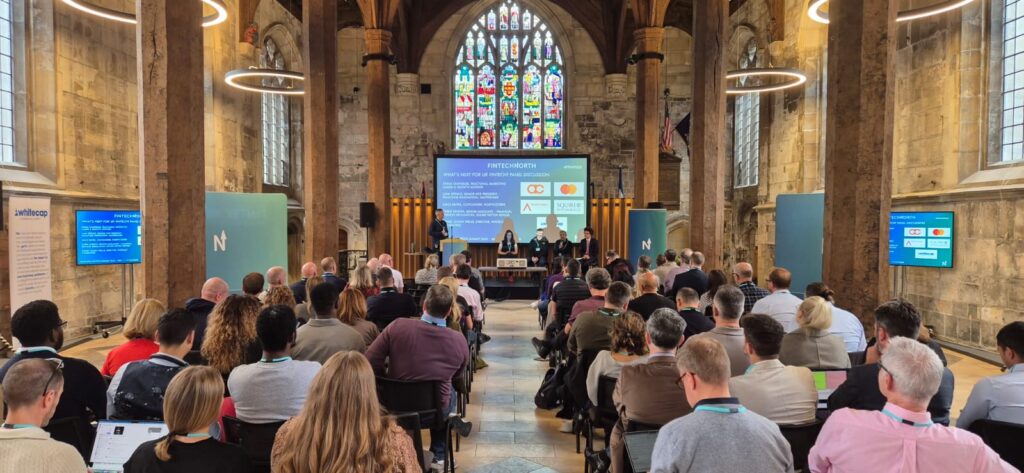
Sector Outlook
The first panel of the day explored the question ‘What’s Next for UK FinTech?’, with perspectives spanning market trends, regulation, people, and innovation. Julian Wells moderated the session, joined by Chris Tanoh, Senior Associate – Financial Services Regulation at Squire Patton Boggs, Liam Spence, Senior Vice President – Franchise Innovation at Mastercard, Anna Chandler, Fractional Marketing Leader & Growth Advisor and Amul Batra, Co-Founder at Northcoders,
The discussion opened with reflections on the current state of the market and the evolving FinTech landscape across the North and the wider UK, five years on from the Kalifa Review. The panellists examined how people, money, and markets remain the foundations of the sector’s growth – each facing new pressures and opportunities in an environment of rapid technological change.
From a regulatory perspective, Chris touched on the UK government’s efforts to foster innovation in financial services in the UK through the digital securities sandbox, the supercharged sandbox and AI Live Testing, the growing focus on data use and access, and how emerging technologies such as tokenisation and blockchain are testing existing frameworks. Panellists also highlighted the rise of RegTech and LegalTech, with new sub-sectors gaining traction and driving innovation in compliance and risk management.
The market conversation extended to international trends, particularly in payments, where the UK remains the world’s second-largest FinTech market after the US. There was agreement that progress continues well beyond London, with Northern FinTech hubs continuing to play an influential role.
On the business and growth front, Anna discussed the changing environment for scaling companies – where ‘growth at all costs’ has given way to sustainable growth, clarity of purpose, and leaner teams enabled by technology. Marketing, brand trust, and culture were recognised as critical growth drivers, with a focus on aligning strategy, communication, and people.
When considering people and technology, the panel explored the role of AI – not as a replacement for people but as a tool to enhance capability and productivity. Themes of trust, responsibility, and skills emerged strongly, alongside discussion of how regulatory sandboxes and evolving policy frameworks could help test and guide innovation responsibly.
Overall, the session painted a picture of a FinTech sector moving from broad expansion into deeper, more focused innovation, underpinned by collaboration, clarity, and a commitment to sustainable, people-centric growth.
The Power of Partnerships
Continuing the theme of collaboration within the market session was a panel titled ‘The Power of Partnerships: Co-Creating the Next Generation of FinTech.’ The panel was led by Rebecca Hall, Inward Investment Manager at The North East Combined Authority, who was joined by James Brown, CEO, of Leeds Credit Union, Amy Morgan, University Innovation Manager at Barclays Innovation Banking and Chris Barnett, Managing Consultant, Risk & Regulation at RSM.
The discussion explored how partnerships in FinTech have evolved from transactional relationships to deeper, more co-creative collaborations. Panellists reflected on the growing recognition that partnerships – between large institutions, smaller innovators, academia, and the public sector – are key to accelerating innovation and delivering better outcomes for customers.
From a market perspective, Chris noted a shift towards specialisation and collaboration as firms increasingly leverage each other’s expertise rather than building everything in-house. This model is maturing, with many predicting further acceleration in the years ahead. Larger organisations are now more open to partnering, recognising that collaboration strengthens rather than threatens their position.
The conversation also touched on the role of regulation as a driver of partnership and innovation. Frameworks such as the Consumer Duty are encouraging firms to engage more closely with under-represented customers, while regulatory sandboxes and innovation hubs – including those within Barclays Eagle Labs, highlighted by Amy – are providing practical spaces for experimentation and co-development.
James highlighted the importance of social impact and the opportunity for partnerships to tackle systemic issues such as financial inclusion and literacy. Examples were shared of collaborations between financial institutions and local organisations designed to better serve vulnerable or underrepresented communities.
The panel agreed that cultural alignment is critical to success. Assessing strategic fit may be straightforward, but ensuring shared values, communication styles, and long-term intent often determines whether a partnership thrives. James noted the increasing richness of data available to inform partnership decisions and improve outcomes for both businesses and customers.
Looking ahead, areas such as AI, data, digital identity, and sustainability were cited as defining the next wave of FinTech partnerships. The discussion closed with advice for start-ups: take time to find the right partner, prioritise cultural fit over quick wins, and avoid pursuing funding alone without a shared vision of success.
After a vibrant lunch networking session, the afternoon shifted to people and culture, exploring how collaboration, skills, and inclusion are shaping the next generation of FinTech. Sessions delved into the power of partnerships between sectors, the importance of aligning industry and academia to close skills gaps, and the role of upskilling and talent development in sustaining growth. Speakers also spotlighted inclusion and accessibility – from supporting women in digital to fostering financial inclusion and education- and reflected on how culture, collaboration, and community will define the future of people in FinTech.
FinTech Skills
Silas Ozoya, Talent Upskill Associate at FinTech North was first to speak, providing a one-year-on update of the organisation’s skills work and progress.
Some key milestones have been the launch of a Skills Trailblazer group to shape a FinTech Apprenticeship in collaboration with Skills England, the delivery of the grant-funded Pitch & Present Masterclass initiative in Leeds, the supporting of 3 summer interns in professional development at FinTech North, and collaboration with Leeds Beckett University across a number of interactive projects and events.
Looking forward, Silas highlighted upcoming work and calls to action for industry engagement to help shape the future of FinTech talent.
Next to the stage was Vinay Chavda, Co-Founder of Seeple, who shared how the platform is reimagining the traditional CV for a fast-changing, digital workforce. Vinay highlighted the enduring importance of the CV in hiring and the need for tools that help individuals showcase their full range of skills, experiences, and potential. He stressed that people remain the most valuable asset in FinTech, even amid increasing digitalisation and debates around AI, and introduced Seeple – meaning ‘see people’ – as a way to give individuals ownership of their professional story.
Vinay demonstrated how Seeple allows users to create digital and traditional CVs that capture not only grades and job titles but also passions, projects, and personality. The free, mobile-first platform supports universities, colleges, and employers, helping students prepare for industries like FinTech and enabling recruiters to discover diverse, often overlooked talent. By championing a people-first approach, Seeple aligns with FinTech North’s mission to drive inclusive growth, ensuring human capability remains at the heart of digital innovation.
Continuing the skills focus, the next panel was titled ‘Closing the Gap: Evolving Opportunities for FinTech Skills’, which was moderated by Samantha Turner, Head of People at Lenvi, and featured Crispin Read, CEO & Founder at The Coders Guild; Rachel Kenyon, Business Engagement Manager at The University of Manchester; Becky Fores, Dean of Higher Education at University Centre Leeds; and Rashmi Arora, Associate Professor in Development Economics at the University of Bradford.
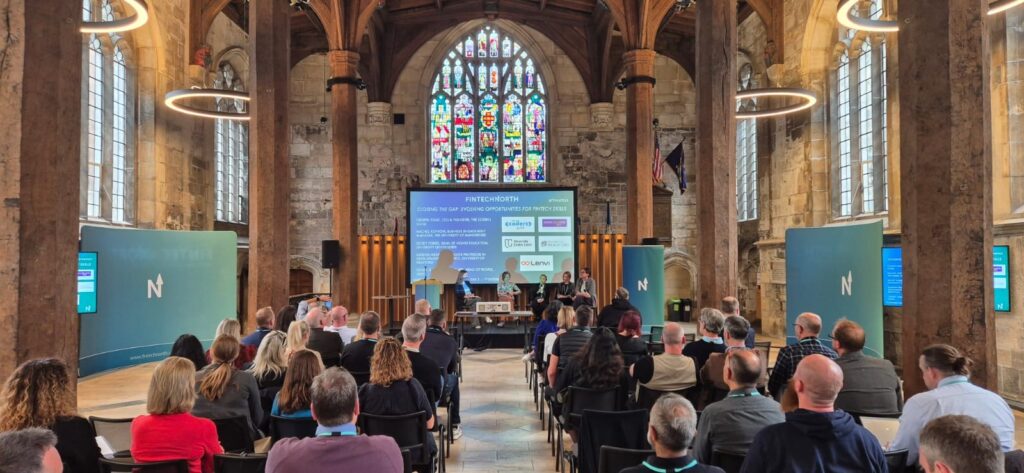
The discussion explored the evolving skills landscape in FinTech, including the importance of hiring for potential rather than just skills, addressing social mobility challenges in the North, and improving financial literacy and inclusion. Panellists also highlighted the role of partnerships between education and industry, Knowledge Transfer Partnerships (KTPs), and collaborative initiatives to prepare learners for a rapidly changing sector.
Crispin argued that building the future workforce depends on developing generalist, transferable skills and hiring for potential – key to both business growth and social mobility – and that closing the skills gap is a shared responsibility across industry, education, and government. Becky highlighted the need for education to align with employer terminology, helping learners understand transferable skills and providing early careers guidance. Sam shared perspectives on mid-career transitions into FinTech, noting how employers can better support these pathways. Rachel expanded on KTPs as a tool to embed capabilities beyond recruitment, and Rashmi discussed the importance of financial literacy, ethics, and social mobility from both local and global perspectives. Panellists concluded that engaging students with industry, promoting applied learning, and integrating continuous professional development are critical to closing the FinTech skills gap.
Inclusion Driving Innovation
Following the panel, Amelia Axelsen, Senior Policy and Programme Manager at City of London Corporation, shared insights from the Women Pivoting to Digital Taskforce. She highlighted how UK employers are struggling to fill digital roles due to skill gaps, rapidly evolving technology, and a shortage of experienced talent. Using data and industry trends, Amelia illustrated the scale of the challenge and the opportunities presented by reskilling existing employees, particularly women, as a practical and cost-effective solution. She also emphasised the value women bring to digital roles, including transferable skills, fresh perspectives on problem-solving, and the ability to quickly adapt through targeted, practical training.
Amelia outlined the Taskforce’s high-profile Digital Skills Pilot Programme, which partners with employers to reskill women from non-technical backgrounds into digital roles. The programme provides a collaborative space for organisations to test reskilling models, create inclusive hiring practices, and build future-ready digital teams. Pilot partners gain practical insights into workforce transformation, increased visibility as champions of inclusion, and strategies to address sector challenges such as talent shortages and recruitment barriers. By promoting overlooked talent pools and supporting women in pivoting careers, the Taskforce aims to strengthen the UK digital workforce while fostering a more inclusive and resilient FinTech ecosystem.
The next panel, focussed on Inclusion Fuelling Innovation and featured Sarah Tulip, Co-Founder at WILD Digital; Rachael Riley, Project Lead at Project Nemo; and James Brown, CEO at Leeds Credit Union. The session was moderated by Suzanne Lawson, Partnerships Manager – Group Innovation at Aviva. The discussion explored how inclusion drives innovation across FinTech and financial services, focusing on careers, financial inclusion, and product development. Panellists highlighted barriers that can act as a barrier preventing diverse candidates from entering the sector, including jargon in job ads, lack of accessible candidate experiences, and the undervaluing of potential over existing skills. Approaches such as mentoring, hackathons, shadowing opportunities, and people-led recruitment were identified as effective ways to open pathways for underrepresented talent.
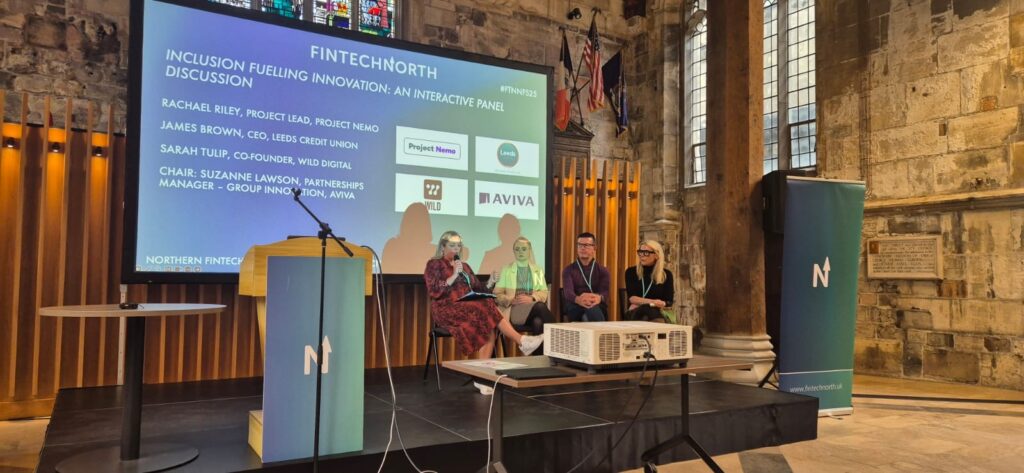
Sarah shared insights from WILD Digital on encouraging diverse candidates into tech roles and creating inclusive recruitment practices, while Rachael emphasised that inclusion is not only the right thing to do but also the right commercial decision. She noted that excluding disabled users – or any underserved group – effectively cuts off a significant customer base, sometimes called the ‘purple pound,’ and that designing accessible products from the outset drives both social impact and business growth. James spoke about balancing community-focused services with commercial pressures at Leeds Credit Union, showing how inclusive approaches can enhance both reach and innovation. Panellists agreed that diverse perspectives improve workplace culture and product development, driving both social value and commercial impact, and concluded with a call for organisations to embed inclusion throughout decision-making and product design.
What’s Next for People?
Closing the conference and providing a future gaze titled Culture, Collaboration, Community: What’s Next for People in FinTech, was Bianca Spruit, Leadership Coach & Trainer at Sprout Coaching. Bianca focussed on the power of leadership, company culture, collaboration and connection. She highlighted the importance of culture in attracting, retaining and aiding company growth, reframing priorities to focus on outcomes rather than journeys, the role of independence and autonomy within teams and maintaining a forward thinking outlook.
Day 1 of the Northern FinTech Summit demonstrated that the North’s commitment to connection, collaboration, and putting people at the heart of innovation continues to be a powerful driver of sustainable growth and sector leadership. As first day of the Summit drew to a close, delegates came together for a the vibrant networking social at Valhalla in the heart of York to build on the connections made that day.
Click here to read about day 2 of the Summit.
Thank You!
Thank you again to our community for attending, our speakers for sharing their insights and to our sponsors, Barclays Eagle Labs, Aviva, Cyber Alchemy, and Lenvi. With thanks to our namebadge sponsors, Incuto, and our inward investment partners West Yorkshire Combined Authority, Invest Liverpool City Region, North East Combined Authority and MIDAS – Manchester’s Inward Investment Agency.
For more information about opportunities for collaboration, reach out to us at info@fintechnorth.uk.
